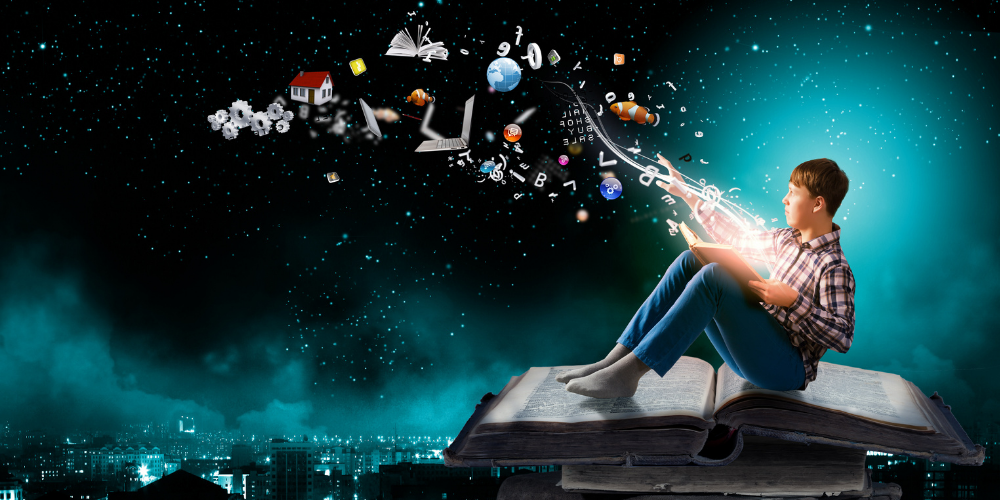Forget Star Wars. Let’s Talk Reading Wars
When I was a kid, if you told me the collective ELA teaching profession couldn’t agree on the best way to teach reading, I would have thought it would be a great sitcom idea, but it’s 100% true. Proponents of two early literacy frameworks have argued about the best way to get kids to learn and love reading for more than 200 years, beginning with Horace Mann.
Horace Mann (then the Secretary of the Massachusetts Board of Education) rallied against teaching the relationship between letters and sounds, referring to letters as “skeleton-shaped, bloodless, ghostly apparitions” and asserting “It is no wonder that the children look and feel so death-like, when compelled to face them.” — Ending the Reading Wars: Reading Acquisition from Novice to Expert.
E-hem. Quite hyperbolic and “Headless Horseman”-like.
Teachers rely on what they’ve learned about best teaching practices during undergrad and graduate work, but also, on the way they were taught as children, with a hybrid of different frameworks. The frameworks all funnel down into 2 camps: Balanced Literacy and The Science of Reading.
Balanced Literacy
Balanced Literacy, associated with the whole language movement, relies on the tradition and experience of reading, leaning on cues and supportive strategies. While the foundational practices of explicit instruction in phonological awareness, fluency, vocabulary, and reading comprehension show up in the framework, there is one important practice missing and/or used sparingly: explicit instruction in phonics.
The Science of Reading
Then, there’s The Science of Reading. Cory Armes, author of the Fast Forward article, “The Science of Reading: The Basics and Beyond,” shares the following definition of The Science of Reading:
The term, “science of reading” refers to the research that reading experts, especially cognitive scientists, have conducted on how we learn to read. This body of knowledge, over twenty years in the making, has helped debunk older methods of reading instruction that were based on tradition and observation, not evidence.
The Science of Reading relies on data to teach foundational practices for early literacy: explicit instruction in phonological awareness, phonics, fluency, vocabulary, and reading comprehension. Recently, The Science of Reading gained significant attention when literacy expert Lucy Calkins changed her thinking from Balanced Literacy by accepting the research as the way early literacy should be introduced.
What it boils down to is phonics. The difference, which you’ve probably surmised, is phonics instruction. With negligible phonics instructions, Armes says,
…they usually do not align with the more sequential approaches of a phonics-based program. What’s more, including some phonics is not only less effective—it’s not effective at all. As Hanford reports, balanced literacy strategies like “three-cueing” are fundamentally at odds with teaching phonics. “One negates the other,” a literacy coach states (Hanford, 2019).
So, what’s the right way? We don’t know, hence the War. Your choice of framework depends on a variety of factors, including how you were taught and your value of tradition vs. data.
Dr. Timothy Rasinski, Professor of Literacy Education at Kent State University offers, “Reading instruction can be studied and guided by science, but the teaching of reading is also an art.”
Both are true. Perhaps someday, the War will end with a peaceful balance.
References
Hanford, E. (2020, October 22). Influential literacy expert Lucy Calkins is changing her views. APM Reports. Retrieved October 29, 2021, from https://www.apmreports.org/story/2020/10/16/influential-literacy-expert-lucy-calkins-is-changing-her-views
Magro, C. (2021, June 19). Reading wars: The science of reading vs. Balanced Literacy. I Love 1st Grade. Retrieved October 29, 2021, from https://ilove1stgrade.com/reading-wars-the-science-of-reading-vs-balanced-literacy/
Rasinski, T. (2021, May 21). The art and science of reading instruction: Learning A. Learning A-Z. Retrieved October 29, 2021, from https://www.learninga-z.com/site/breakroom/dr-rasinski-art-and-science-of-reading
Rastle, K., Castles, A., & Nation, K. (n.d.). Ending the reading wars: Reading acquisition from novice to expert – Anne Castles, Kathleen Rastle, Kate Nation, 2018. SAGE Journals. Retrieved June 11, 2018, from https://journals.sagepub.com/doi/full/10.1177/1529100618772271.







